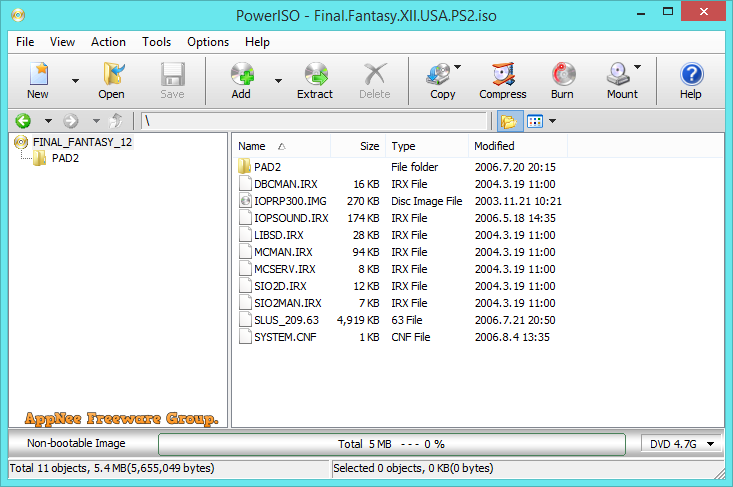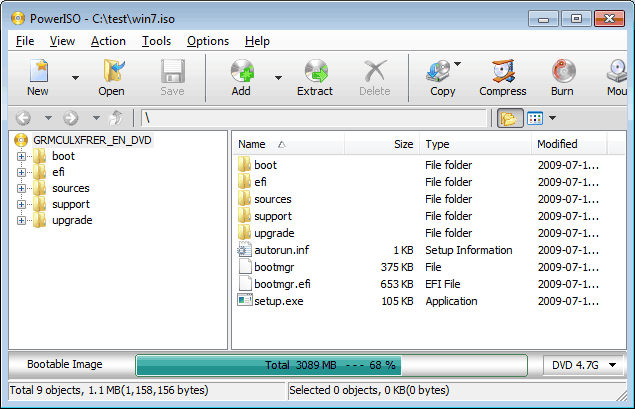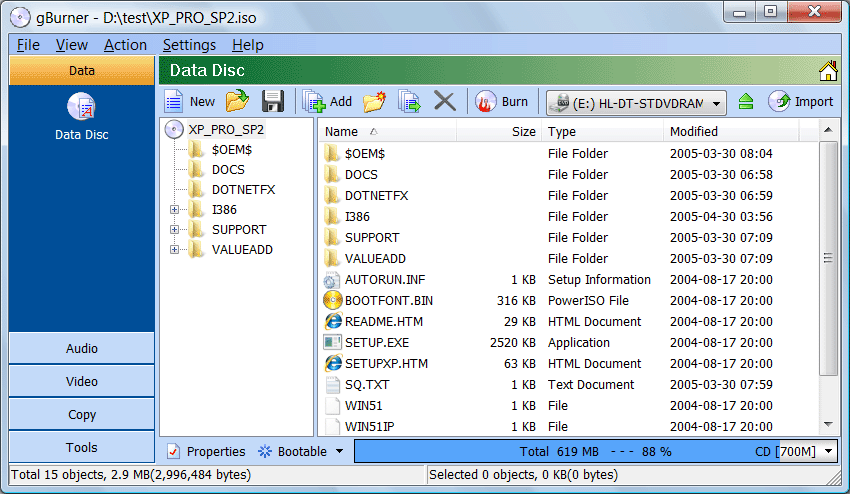A CD, DVD, BD image file processing tool allows users to create, edit, and manage disc image files efficiently. These tools support various formats and enable seamless data manipulation.
CD, DVD, and BD image file processing tools are essential for managing disc images. They support formats like ISO, BIN, and NRG, helping users create, edit, and convert files. These tools offer functionalities such as burning images to physical discs, extracting files, and creating bootable drives.
Users benefit from features like data verification, compression, and encryption. Compatibility with different operating systems ensures versatile usage. Whether you’re backing up data or creating multimedia projects, these tools simplify complex tasks, making them indispensable for both casual users and professionals.

Credit: spyware.neocities.org
Introduction To Image File Processing Tools
Image file processing tools are essential for managing digital media. These tools help in creating, editing, and organizing image files. They offer various features to enhance the user experience. Understanding their role can simplify data management tasks.
The Role In Data Storage
Image file processing tools play a crucial role in data storage. They help in creating backup copies of digital media. This ensures data safety and easy recovery. These tools also assist in compressing files to save space. Users can manage large amounts of data efficiently.
Evolution From Cd To Blu-ray
Data storage has evolved significantly over the years. Initially, CDs were the primary storage medium. They could hold up to 700 MB of data. With technological advancements, DVDs replaced CDs. DVDs offered more storage capacity, up to 4.7 GB.
Eventually, Blu-ray discs took over. They offer even more storage, up to 25 GB per layer. This evolution has greatly impacted image file processing tools. Modern tools support multiple formats, including CD, DVD, and Blu-ray. This makes them versatile and user-friendly.
| Storage Medium | Capacity | Advantages |
|---|---|---|
| CD | 700 MB | Widely used, cheap |
| DVD | 4.7 GB | More storage, better quality |
| Blu-ray | 25 GB per layer | High capacity, HD quality |
- CDs are good for small data.
- DVDs are suitable for medium-sized data.
- Blu-rays are best for large data and high-definition videos.
Understanding these tools and storage media can enhance your data management. Choose the right tool for your needs. This will ensure efficient and effective data handling.
Core Functions Of Image File Tools
Image file tools are essential for handling CD, DVD, and BD images. They provide various functions to manage and manipulate these image files. Let’s dive into the core functions of these tools.
Creating Image Files
One primary function is creating image files from physical discs. This process involves copying all data from a CD, DVD, or BD into a single file. The resulting image file can be saved on your computer.
Benefits of creating image files include:
- Preservation of original content
- Convenient storage and transport
- Quick access without the physical disc
Most tools support multiple formats, such as ISO, BIN, and CUE. Users can choose the format based on their needs. Below is a table showing popular formats and their use cases:
| Format | Use Case |
|---|---|
| ISO | Universal standard for data storage |
| BIN | Common for CD images |
| CUE | Metadata files for BIN images |
Mounting And Emulating Drives
Another critical function is mounting and emulating drives. This allows users to access image files as if they were physical discs. The tool creates a virtual drive on your computer.
Steps to mount an image file:
- Select the image file.
- Choose the mount option in the tool.
- Access the new virtual drive.
Mounting image files offers several advantages:
- No need for physical discs
- Faster access and loading times
- Support for multiple virtual drives
With these functions, users can manage their media more efficiently. Image file tools are crucial for anyone dealing with CD, DVD, or BD media.
Popular Formats: Iso, Bin, Cue, And More
Working with CD, DVD, and BD image files requires knowledge of popular formats. These formats help you store, manage, and use disk images effectively. Let’s explore the most common formats: ISO, BIN, CUE, and more.
Characteristics Of Each Format
Each format has unique features that make it suitable for different tasks. Understanding these characteristics can help you choose the best format for your needs.
| Format | Characteristics |
|---|---|
| ISO | ISO files are the most common disk image format. They are widely supported by many tools. ISO files are easy to create and use. |
| BIN | BIN files store raw binary data. They often come with a CUE file. BIN files are useful for copying disks exactly. |
| CUE | CUE files describe the layout of BIN files. They include track information. CUE files help in mounting and burning disks accurately. |
| Other formats | Other formats include NRG (Nero), MDF (Alcohol 120%), and IMG. These formats are less common but still used for specific applications. |
Choosing The Right Format
Selecting the right format depends on your specific needs and tools. Here are some tips to guide your choice:
- ISO is ideal for most users due to its widespread support.
- BIN/CUE is perfect for exact disk copies and older software.
- Consider other formats if you use specific tools like Nero or Alcohol 120%.
Choosing the right format ensures compatibility and ease of use. Always check your tools’ support for each format before starting your project.
Advanced Features Unlocked
The Cd Dvd Bd Image File Processing Tool offers powerful features. These features make it a must-have for users. Let’s explore two key features that stand out.
Disk Encryption And Security
Security is a top priority for any user. This tool provides disk encryption to protect your data. Encryption ensures that only authorized users can access the files. It uses strong algorithms to encrypt your data. This keeps your information safe from unauthorized access. You can also set passwords to add an extra layer of security.
With this tool, you can encrypt entire disks or specific files. This flexibility allows you to choose what needs protection. The encryption process is simple and user-friendly. You don’t need to be an expert to secure your data.
Compression And Splitting
Storage space is always a concern. The tool offers compression to save space. It reduces the file size without losing quality. This is helpful for large image files. You can store more files on the same disk.
Another useful feature is splitting. You can split large files into smaller parts. This makes it easier to manage and transfer files. For example, you can split a large file into parts that fit on multiple CDs.
| Feature | Benefit |
|---|---|
| Compression | Save storage space |
| Splitting | Manage large files easily |
Both compression and splitting are easy to use. The tool guides you through each step. This makes the process quick and efficient.
Comparing Top Image File Processing Software
Choosing the right CD, DVD, and BD image file processing tool is crucial. It ensures efficiency and quality in handling your media files. This section compares the top software options available. We’ll evaluate them based on user interface, ease of use, and performance benchmarks.
User Interface And Ease Of Use
A user-friendly interface makes a big difference. Below is a comparison of the user interfaces of top tools:
| Software | User Interface | Ease of Use |
|---|---|---|
| PowerISO | Clean, modern design | Highly intuitive |
| UltraISO | Simple, traditional layout | Moderate learning curve |
| MagicISO | Basic, minimalistic design | Easy for beginners |
Performance Benchmarks
Performance is key for any image file processing tool. We tested the following tools:
- PowerISO: Fast processing speed
- UltraISO: Reliable and consistent
- MagicISO: Good performance on smaller tasks
Here’s a detailed comparison of their performance benchmarks:
| Software | Processing Speed | Reliability |
|---|---|---|
| PowerISO | High speed | Very reliable |
| UltraISO | Moderate speed | Highly consistent |
| MagicISO | Good for small tasks | Decent reliability |
These benchmarks highlight the strengths of each tool. PowerISO excels in speed and reliability. UltraISO offers consistent performance. MagicISO is suitable for simpler tasks.

Credit: appnee.com
Step-by-step Guide To Managing Disk Images
Managing disk images can seem tricky. With the right tool, it’s simple. This guide will help you master disk images. Learn to create and troubleshoot disk images easily.
Creating Your First Disk Image
Creating your first disk image is a breeze. Follow these steps:
- Open the Cd Dvd Bd Image File Processing Tool.
- Insert your CD, DVD, or BD into the drive.
- Select the option to create a new image file.
- Choose the drive containing your disk.
- Pick a destination folder for the image file.
- Click “Start” to begin the process.
The tool will create the image file. This may take a few minutes. Once done, you will see the new image file in your chosen folder.
Troubleshooting Common Issues
Sometimes, you may face issues. Here are common problems and solutions:
- Image file creation fails: Check the disk for scratches or dirt. Clean the disk and try again.
- Tool not recognizing the disk: Ensure the disk is properly inserted. Restart the tool if needed.
- Image file is too large: Ensure there is enough space on your hard drive.
If problems persist, consult the tool’s help section. Most issues have simple fixes. Keep your software updated for best performance.
Integrating With Cloud And Virtual Machines
Integrating your CD, DVD, and BD image file processing tools with cloud services and virtual machines can streamline your workflow. This integration brings enhanced storage, accessibility, and flexibility to your data management processes.
Storing Images On The Cloud
Storing your disk images on the cloud offers many benefits. Cloud storage ensures your files are safe and accessible from anywhere. You can easily share and collaborate on these files with your team.
- Accessibility: Access your disk images from any device.
- Security: Protect your files with advanced encryption and backup.
- Scalability: Easily scale your storage needs as your data grows.
Using cloud storage also frees up local storage space. This can improve the performance of your local machines. Here’s a quick comparison of popular cloud storage services:
| Service | Free Storage | Additional Features |
|---|---|---|
| Google Drive | 15 GB | Collaboration tools, integration with Google Workspace |
| Dropbox | 2 GB | File sharing, team collaboration features |
| OneDrive | 5 GB | Integration with Microsoft Office |
Using Disk Images In Virtual Environments
Disk images are essential for virtual environments. They allow for easy setup and management of virtual machines. Using disk images, you can quickly replicate environments and ensure consistency.
Here are some key benefits:
- Efficiency: Quickly deploy and manage multiple virtual machines.
- Consistency: Ensure all virtual machines have the same setup.
- Backup: Easily backup and restore virtual environments.
Implementing disk images in virtual environments can simplify your IT infrastructure. It reduces the need for physical hardware and speeds up deployment times.
To integrate disk images with virtual machines, follow these steps:
1. Create a disk image of your desired system.
2. Upload the image to your virtual machine manager.
3. Configure the virtual machine to use the uploaded disk image.
4. Start the virtual machine and verify the setup.By integrating your disk images with cloud storage and virtual machines, you can achieve a more flexible and efficient workflow.

Credit: www.poweriso.com
Future Of Disk Imaging Technology
Disk imaging technology has evolved significantly. Tools for Cd Dvd Bd Image File Processing are now more advanced. The future looks promising with new developments. Here, we explore some key trends.
The Impact Of Cloud Storage
Cloud storage is changing disk imaging. It offers easy access and backup. Users can store images securely online. This reduces the need for physical disks.
Cloud solutions also support collaboration. Multiple users can access disk images simultaneously. This is useful for businesses and teams.
| Benefit | Description |
|---|---|
| Accessibility | Access files from anywhere |
| Security | Store data with high security |
| Collaboration | Share files with team members |
Innovations On The Horizon
AI and machine learning are set to revolutionize disk imaging. They can automate many tasks. This includes error detection and file organization.
Blockchain technology may also play a role. It can ensure data integrity and security. This is crucial for sensitive information.
We can expect faster processing speeds. New algorithms and hardware improvements will make this possible.
- AI for error detection
- Blockchain for data security
- Faster processing speeds
Frequently Asked Questions
How Do I Create An Iso Image From A Dvd Bd Or Cd?
To create an ISO image from a DVD, BD, or CD, use software like ImgBurn or PowerISO. Insert the disc, select “Create image file from disc,” and save the ISO file to your computer.
Is There A Free Cd/dvd Burner For Windows 10?
Yes, there are free CD/DVD burners for Windows 10. Popular options include BurnAware Free, CDBurnerXP, and Ashampoo Burning Studio Free.
How To Burn A Bootable Iso Image File To Cd Dvd Rom?
To burn a bootable ISO image to CD/DVD ROM, use software like ImgBurn or Nero. Insert a blank disc, open the software, select the ISO file, and choose the burn option. Ensure the burn settings are correct, then start the process.
Verify the disc after burning.
Does Windows 10 Have Cd Copy Software?
Yes, Windows 10 includes Windows Media Player, which can copy (rip) CDs. Third-party software options are also available.
Conclusion
Mastering the CD, DVD, and BD image file processing tool enhances your digital storage management. It saves time and boosts efficiency. Dive into its features and simplify your tasks. This tool is indispensable for anyone handling large volumes of data.
Embrace it to streamline your workflow and improve productivity.







